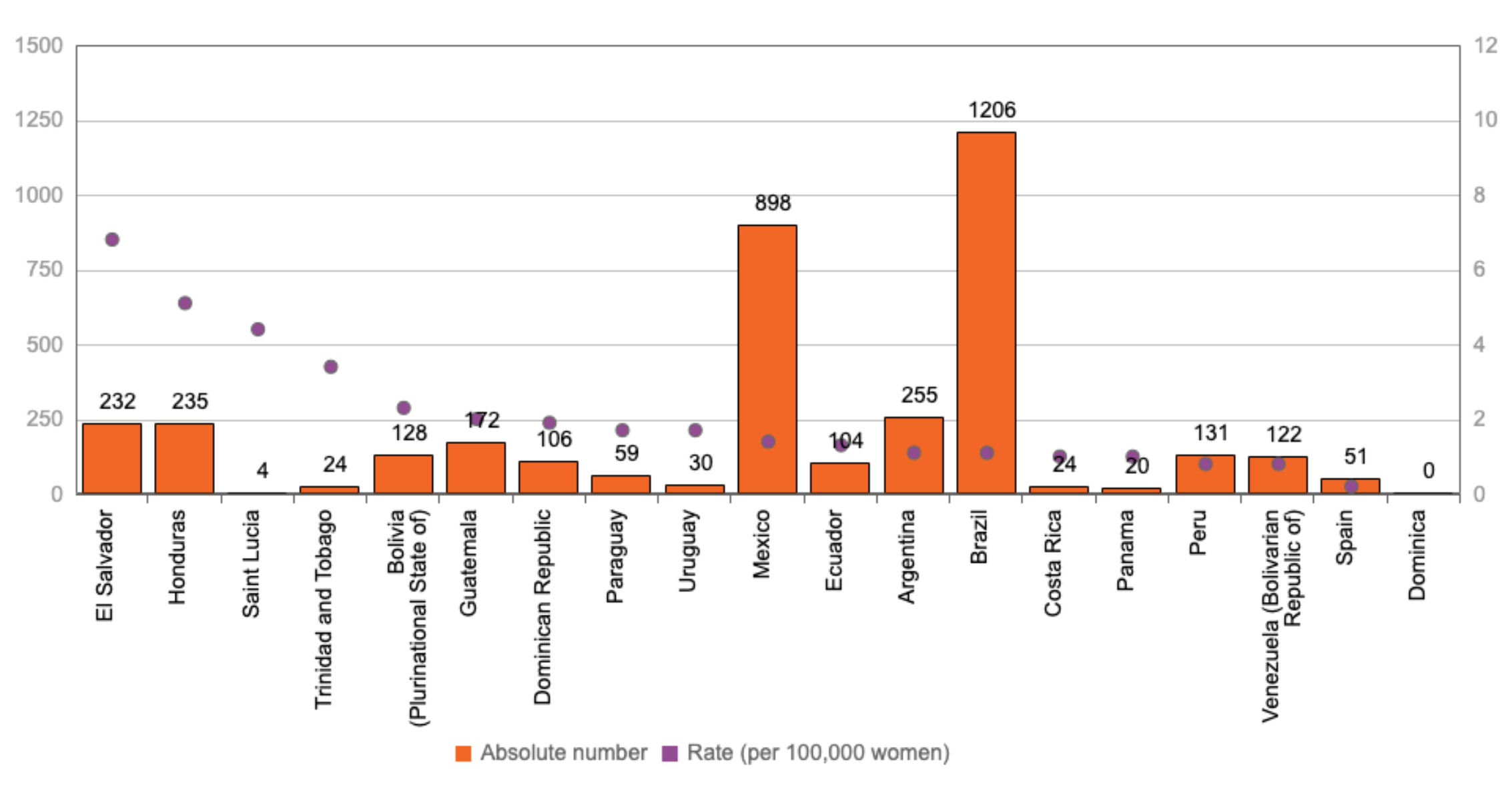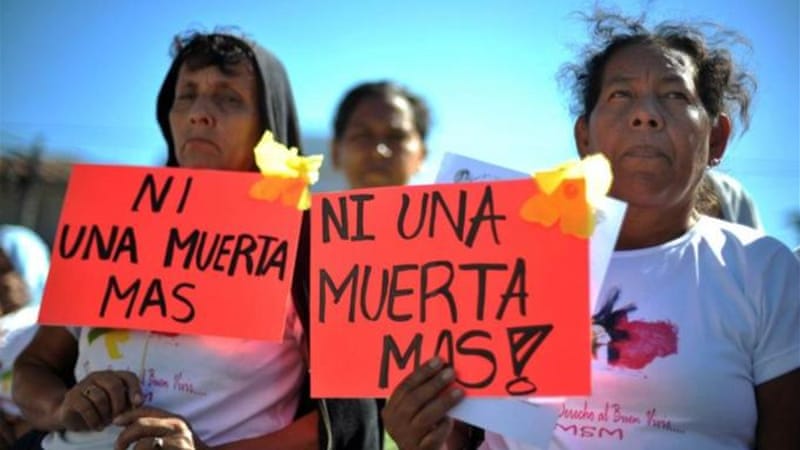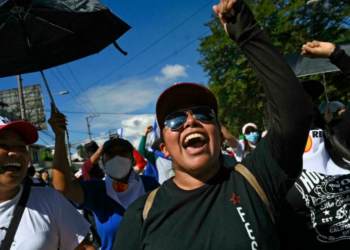In a landmark conviction by a Salvadoran judge on January 31, Mario Huezo was given the maximum sentence of 50 years in prison for the 2018 killing of Salvadoran journalist Karla Turcio, his girlfriend and mother of their son. Huezo stands convicted of femicide, defined as the killing of a girl or woman by a man specifically because of their gender identity as female. While prosecuting one femicide in El Salvador does not undo the country’s entrenched and dangerous patriarchy, it is a start.
El Salvador has one of the highest rates of femicide in the world, and an abysmal human rights record protecting vulnerable categories of people, including indigenous peoples, those reporting crimes, those demonstrating political opposition to gangs or political parties, and women and girls who challenge entrenched machismo, or patriarchy.
Though the Salvadoran Congress passed the Special Comprehensive Law for a Violence-free Life for Women, which went into effect in 2012, the conviction rate for gender-based crimes remains extremely low.
Femicides in El Salvador
Femicide statistics remain hard to come by because, like many gender-based crimes in Latin America, including domestic violence and rape, femicides are drastically underreported due to legitimate fear that perpetrators may abuse victims or their surviving family members even more severely for reporting the crime.
The Salvadoran Women’s Organization for Peace, a leading feminist group, publishes numerous reports in Spanish documenting these dynamics.
El Salvador is one of the most dangerous places to be a woman.
The government has now appointed a special prosecutor for gender-related killings of women. Watch the full story of how journalist Karla Turcio's killing changed El Salvador: https://t.co/X4jvAkIM82 pic.twitter.com/BflOmzyt4M
— BBC 100 Women (@BBC100women) November 26, 2018
As in Mexico, the authorities to whom someone may report, namely the police, are frequently corrupt and generally steeped in the same patriarchal culture that condones gender-based violence in the first place. There have been numerous instances of survivors in Latin America reporting sexual abuse to the police only to be further abused by the police themselves.
Underreported Crimes
In 2019, there were 1,218 Salvadoran women listed as victims of disappearance, abductions, or unexplained missing person cases, with 232 confirmed femicides in 2018. However, scholars, journalists, and civil society members who focus on gender-based violence in El Salvador know that the real numbers are much higher.

As a scholar of both El Salvador and Mexico, and someone who serves as an expert witness for U.S. asylum cases for people from both countries, I have read numerous cases of asylum-seekers detailing why they didn’t report gender-based violence. Reasons include the police being either gang-involved themselves or colleagues or friends with the abuser. Other reasons were that the police would either further the abuse themselves, or dismiss the abuse as to be expected given the cultural context of machismo.
Machismo in El Salvador
Machismo, which in today’s language could be described as toxic masculinity, is more than just manly swagger. It entails a system of gender-based domination. Women and girls who resist this domination and attempt to assert their rights to be free from it face increased violence at the hands of their abusers, who may be either unknowns, family members, or in the Turcio case, intimate partners.
Contemporary impunity in El Salvador can be directly linked to the country’s 1980 – 1992 civil war and the lack of real democratization in its aftermath. Impunity is such an extensive problem that even U.S. human rights reports on El Salvador routinely note that although steps have been taken to include the language of international rights norms, these steps may be insufficient to actually protect women’s rights as human rights.
As students of laws and constitutions around the world know, such documents are frequently aspirational on paper and very rarely reflected in practice. Such is the case with El Salvador’s 2012 femicide law.
Deep-Rooted Male Privilege
While the lead prosecutor in the Huezo case, Graciela Sagastume, is right that Huezo’s conviction is symbolically important, El Salvador faces deep-seated opposition to undoing an entrenched culture of male privilege and domination.
Culturally, men and boys are directly and indirectly taught and encouraged to exercise power over women and girls, and male power is culturally and legally prioritized over female rights. The cultural practice of sexism is reinforced through direct and indirect messages of religious leaders, mainstream media, public policy, music, culture, and in familiar spaces.
In short, this means that being female in El Salvador increases the risk of experiencing abuse at the hands of individuals as well as by social groups such as gangs and the police. Women and girls who challenge this imbalance make themselves even more vulnerable targets.
The rationale for exerting extreme physical and sexual violence upon girls and women stems from the deeply rooted misogyny, combined with a culture of impunity that is a direct result of the post-war process.
This message of consequence-free male domination, when coupled with the reality of a weak central government that does not have a monopoly on violence, means that the state cannot protect its citizens.
The Salvadoran Congress can pass high-minded human rights laws to obtain international respectability – and it should, because creating such legal framework is part of the incremental work of system-building – yet the reality remains that El Salvador is currently unable to guarantee the human rights of many women and girls to their physical integrity.
Mneesha Gellman is author of Democratization and Memories of Violence: Ethnic minority rights movements in Mexico, Turkey, and El Salvador and numerous articles on Latin American politics.
Disclaimer: The views and opinions expressed here are those of the author and do not necessarily reflect the editorial position of The Globe Post.























